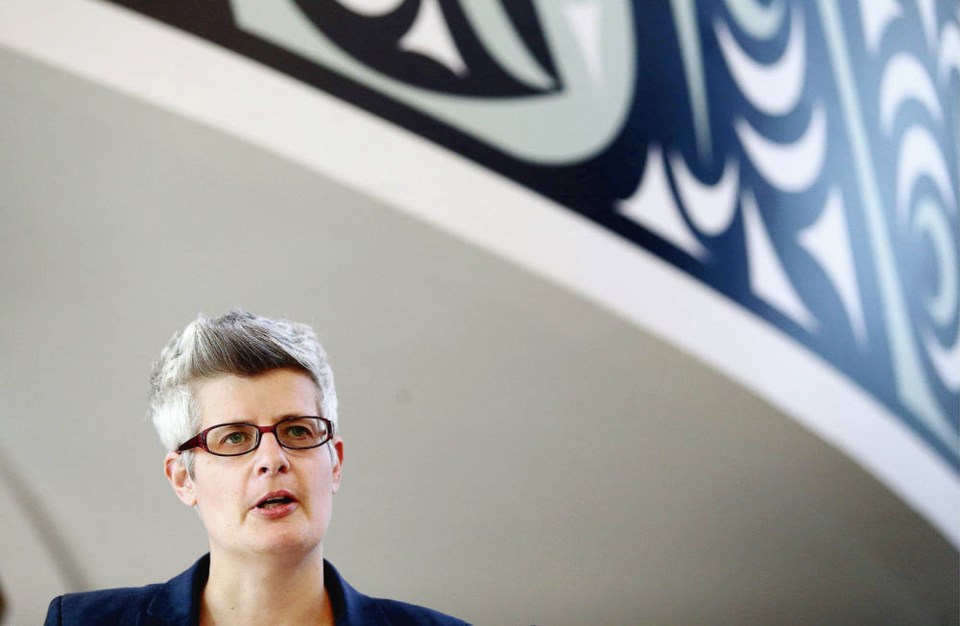The final days before Christmas looked pretty much like every other day of the past year for Victoria Mayor Lisa Helps as she dealt with yet another housing crisis.
After waking Dec. 22 to a text telling her that winter rains had flooded people without homes from their tents in Central Park, she got on the phone with B.C. Housing, Island Health, Our Place Society and others to help organize an emergency response.
By 10:30 a.m., everybody was on a conference call that led to a second meeting at 12:30 p.m. and a third at 3:30 p.m., at which time a plan was taking shape to establish a new camp in the parking lot next to Royal Athletic Park.
The following day, tents were set up and people were on the move.
Although she said there is much more work ahead to get people indoors, Helps credited the quick response to the city’s strong relationships with outside agencies. She said those relationships have deepened during the COVID-19 pandemic.
“If you don’t have relationships, it doesn’t work,” she said in a year-end interview. “If you’ve got bad relationships, it’s even worse”
She likened the flood situation to the twice-weekly meetings with businesses this year that spawned the Build Back Victoria program and outdoor patios.
“It doesn’t matter what happens,” she said. “When something hits, those relationships are in place, and it allows us to move really quickly.”
It’s the community’s resilience in the face of crisis that stood out for Helps this past year. “If you look back to March, in the beginning of the pandemic, people just leapt into action right away.”
At the same time, she said, the pandemic exposed failures by all levels of government to take care of vulnerable people, many of whom ended up on the streets or in parks when shelters closed or reduced their beds due to physical-distancing rules.
“If we had been doing a better job for the past three decades [of] housing people, making sure that people had access to the health supports they need, the pandemic wouldn’t have been so hard on the people who are out there sleeping in our parks, and also not so hard on the people living around parks,” she said.
Helps and council bore the brunt of criticism in Victoria for allowing around-the-clock camping in parks during the pandemic. A citizen-led petition to “save Beacon Hill Park” received more than 28,000 signatures online and Coun. Stephen Andrew’s promise to do things differently propelled him to victory in the Dec. 12 byelection.
Helps said there’s always room for improvement and different approaches to problems. “I am not a black and white person,” she said. “I don’t think we’ve done everything great. And I don’t think we’ve done everything terribly. I think we are certainly doing our best.”
And she remains optimistic that the city, with help from other agencies, will achieve its goal of ending around-the-clock camping in parks by the end of March.
“That work … has already begun,” she said, noting that 37 people moved indoors in November.
Helps, who is midway through her second term as mayor, said she still plans to step aside in two years.
“I think eight years in a leadership role is enough,” she said. “Also, we will have achieved a lot over the past eight years, really some transformative projects, and I think it’s time to hand over the city to someone else and let them put their put their mark on it.”
She’s particularly proud, she said, of the Victoria 3.0 economic action plan that will help the city diversify its economy over the next 20 years. “So that if we get into another situation where the tourists stop coming and all the provincial employees stay at home, our downtown isn’t hit so hard.”
And she has big plans for her final two years in office, including launching a business hub for marine companies and rezoning for a new arts and innovation district. She also wants to see an Island-wide climate action plan adopted and a plan for a new Central Library. “Probably not under construction,” she said, “but at least some surety that we will have a new or greatly refurbished Central Library.”
Helps acknowledged that many people will associate her time in office with the controversial all-ages-and-abilities bike lanes. But she hopes to leave a city that’s better at innovating and acting quickly in the face of challenges, as it did in response to the pandemic and the recent flood in Central Park.
“I think that the way we do business is deeply, deeply collaborative, and really relationship-based and I hope that that’s a legacy that’s left in terms of how the city operates.”
lkines@timescolonist.com



